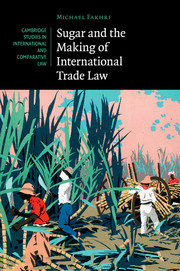Crossref Citations
This Book has been
cited by the following publications. This list is generated based on data provided by Crossref.
2016.
Exclusion from Public Space.
p.
552.
2016.
The Doctrine of Odious Debt in International Law.
p.
223.
Lustig, Doreen
2017.
Governance Histories of International Law.
SSRN Electronic Journal,
VENZKE, Ingo
2018.
What if? Counterfactual (Hi)Stories of International Law.
Asian Journal of International Law,
Vol. 8,
Issue. 2,
p.
403.
SINCLAIR, GUY FITI
2018.
Towards a Postcolonial Genealogy of International Organizations Law.
Leiden Journal of International Law,
Vol. 31,
Issue. 4,
p.
841.
Wang, Kuan‐chi
2018.
Food Safety and Contract Edamame: The Geopolitics of the Vegetable Trade in East Asia.
Geographical Review,
Vol. 108,
Issue. 2,
p.
274.
Smith, Fiona
2018.
The Future of International Economic Integration.
p.
81.
CLARK, MARTIN
2018.
Ambivalence, anxieties / Adaptations, advances: Conceptual History and International Law.
Leiden Journal of International Law,
Vol. 31,
Issue. 4,
p.
747.
Parfitt, Rose
2019.
The Process of International Legal Reproduction.
2019.
Sovereignty in China.
p.
275.
Dunworth, Treasa
2020.
Humanitarian Disarmament.
2020.
Humanitarian Disarmament.
p.
257.
BLACKETT, Adelle
2020.
Place du régionalisme social dans le droit transnational du travail.
Revue internationale du Travail,
Vol. 159,
Issue. 4,
p.
659.
BLACKETT, Adelle
2020.
Regionalismo social y derecho transnacional del trabajo.
Revista Internacional del Trabajo,
Vol. 139,
Issue. 4,
p.
651.
Storr, Cait
2020.
International Status in the Shadow of Empire.
2020.
International Status in the Shadow of Empire.
p.
300.
BLACKETT, Adelle
2020.
On social regionalism in transnational labour law.
International Labour Review,
Vol. 159,
Issue. 4,
p.
591.
Quiroga-Villamarín, Daniel R.
2020.
Domains of Objects, Rituals of truth: Mapping Intersections between International Legal History and the New Materialisms.
International Politics Reviews,
Vol. 8,
Issue. 2,
p.
129.
Fakhri, Michael
2020.
New Voices and New Perspectives in International Economic Law.
p.
55.
Eilstrup-Sangiovanni, Mette
and
Verdier, Daniel
2021.
To Reform or to Replace? Institutional succession in international organizations.
SSRN Electronic Journal ,





